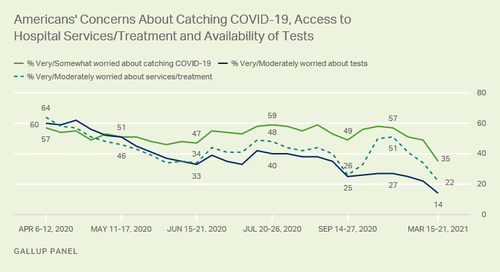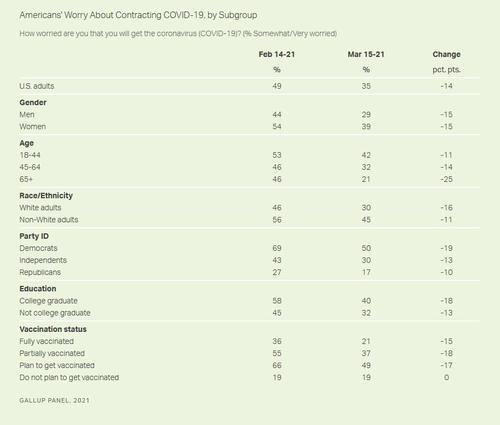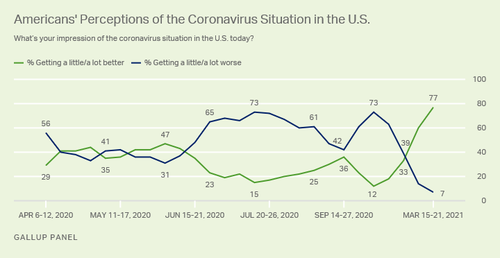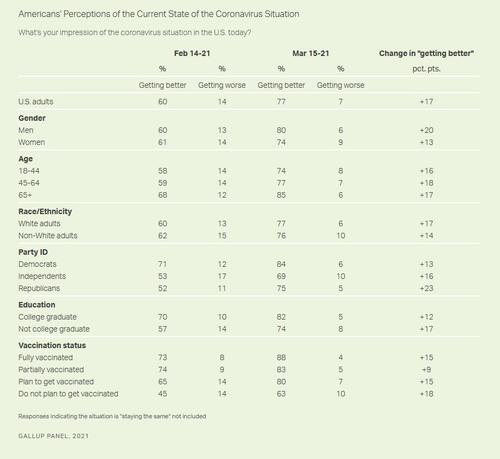Americans’ Fear Of Catching COVID-19 Drops To Record Low: Gallup
By RJ Reinhart of Gallup.com,
Highlights
-
35% of Americans are worried about catching COVID-19, down from 49%
-
77% say the COVID-19 situation in the U.S. is improving, up from 60%
-
64% report at least a fair amount of disruption to their lives, down from 70%
At the same time Americans’ satisfaction with the rollout of the COVID-19 vaccine has surged, their concerns about getting the virus and about the availability of coronavirus tests and hospital services/treatment have fallen to record lows.
Thirty-five percent of U.S. adults now say they are very or somewhat worried about contracting COVID-19, the lowest point in Gallup’s trend since April 2020. Twenty-two percent of Americans are very or moderately worried about access to hospital services/treatment, and 14% are just as worried about access to COVID-19 tests.
These data come from Gallup’s latest COVID-19 probability-based web panel survey, conducted March 15-21 as vaccination rates continued to climb across the country. The current 35% worried about contracting COVID-19 is down 14 percentage points from February, and well off the record-high 59% of Americans who voiced concerns about catching the disease last summer. That high came as the number of COVID-19 cases surged following the lifting of restrictions on businesses in June.
Worry about contracting COVID-19 is down among almost all key segments of society since February, especially among older adults. The decline among older Americans, and the decline more generally, may be tied to the increase in the percentage of Americans who are fully vaccinated. That group has one of the lowest levels of worry among all major subgroups, with 21% (down from 36%) expressing concerns about getting COVID-19.
However, substantial subgroup differences in levels of worry persist, particularly by political affiliation. Half of Democrats continue to be very or somewhat worried about contracting the disease, compared with 17% of Republicans and 30% of independents. Additionally, there are substantial differences among age groups, with 42% of those aged 18 to 44 worried, compared with 32% of those aged 45 to 64 and 21% of those aged 65 and older.
Naturally, being vaccinated is associated with lower levels of worry about contracting COVID-19, but this only applies to those who are fully vaccinated. Among those Americans who report having received the full course of the vaccine, 21% are worried about catching COVID-19. But the rate among those only partially vaccinated (defined as receiving only one dose of a two-dose vaccine) is 37%, similar to the national average.
Those who plan to get the vaccine but have not currently done so are the most likely segment of Americans to be concerned about contracting the disease, with 49% saying so. Conversely, those who do not plan to be vaccinated are among the least likely, with 19% reporting worry about contracting COVID-19.
Roughly Eight in 10 Americans See Situation Improving
This decline in worry comes as Americans’ assessment of the COVID-19 situation in the U.S. is the most positive, by far, that it’s been at any point during the pandemic. Seventy-seven percent of Americans now say the situation is getting better, up from 60% in February and 33% in January. Before January, the high was 47%, recorded last June as states were lifting restrictions on businesses. Positive impressions of the situation have sunk below 20% several times, including as recently as December.
Perceptions that the COVID-19 situation is getting better have improved among all key subgroups, although slight differences persist. Notably, the percentage of Republicans who say the situation is improving increased by 23 points to 75%, though this remains below the 84% of Democrats who now say the same. Additionally, optimism among men rose 20 points; 80% now say the COVID-19 situation is getting better.
Modestly Fewer Americans Seeing COVID-19 Disruption
As they have from the early days of the pandemic, a majority of Americans (64%) continue to say their lives have been disrupted a great deal or fair amount by the coronavirus situation. This is down modestly from the 70% who said the same in February and roughly equal to the 65% recorded last June. At that time, states began loosening restrictions on businesses as infection rates dropped. However, the number of cases climbed again shortly after, and these restrictions largely returned.
The drop in the percentage of Americans seeing COVID-19-related disruption in their lives may be at least partly due to a decline in the number of adults who say they are engaging in strict social distancing practices.
When asked how long they believe the disruption from COVID-19 will continue, a majority of Americans see it continuing for the foreseeable future. Thirty-three percent say it will last “a few more months,” while 44% predict it will persist through the end of 2021 and 19% see it continuing longer. A different version of this question asked in February found 38% of Americans believing the disruption would last through the first half of 2021 while 52% believed it would continue longer than that.
Bottom Line
Americans have become substantially less worried about contracting COVID-19 as a growing proportion of adults have been fully vaccinated and as satisfaction with the vaccine rollout has improved. These shifts have occurred while coronavirus infection rates have fallen substantially from highs reached in January of this year. Optimism about the COVID-19 situation has also spiked to a record high. Gallup previously observed a meaningful relationship between Americans’ perceptions of the coronavirus situation and changes in reported numbers of daily new cases.
After the March survey was conducted, infection rates began to rise again. This may be at least partially connected to the decrease in reported strict social distancing by Americans at a time when more contagious variants of the virus are spreading. Public health experts see the U.S. now in a race to get large numbers of Americans vaccinated before those variants spread further. The outcome of that race will determine the future course of infections in the U.S. and will likely determine whether Americans show continued increasing optimism about the COVID-19 situation or a course correction in their attitudes.
Tyler Durden
Tue, 04/06/2021 – 09:32![]()
Zero Hedge’s mission is to widen the scope of financial, economic and political information available to the professional investing public, to skeptically examine and, where necessary, attack the flaccid institution that financial journalism has become, to liberate oppressed knowledge, to provide analysis uninhibited by political constraint and to facilitate information’s unending quest for freedom. Visit https://www.zerohedge.com





